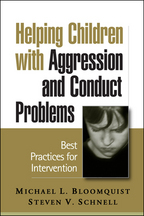Helping Children with Aggression and Conduct Problems
Best Practices for Intervention
Michael L. Bloomquist and Steven V. Schnell
“Provides a thorough and up to date overview of best practice in assessment and intervention for children with aggression and conduct problems up to age 12....The book is grounded in empirical research, well organized with good use of summary tables and examples of assessment tools and clinical handouts, and provides a highly readable, lucid account.”
—Clinical Child Psychology and Psychiatry
“As an educator, researcher, and therapist, I found the book to be worthwhile reading, and it will remain an important reference book in my library....It is refreshing to read how other scholars and practitioners are also working with these children and facing similar dilemmas.”
—Social Work Today
“This very user-friendly volume provides a superb, up-to-date overview of the research base and clinical procedures for intervening with childhood aggression and conduct problems. It will serve as an excellent resource for professionals working in mental health, social welfare, and school settings. Moreover, use of this volume in graduate programs in social work, psychology, counseling, and education will make an important contribution to educating the next generation of professionals in the use of evidence-based best practices.”
—Scott W. Henggeler, PhD, Department of Psychiatry and Behavioral Sciences, Medical University of South Carolina
“Two of the key strengths of this book are the text's provision of the best discussion at this time of the range of empirically supported interventions [and its] innovative and creative effort to abstract common content elements from empirically supported intervention programs....Bloomquist and Schnell have approached this task in a highly systematic and thoughtful manner, and the result is outstanding.”
—from the Foreword by John E. Lochman, PhD, The University of Alabama
“This is the most comprehensive text I have seen on assessment and treatment of children with antisocial behavior. It is a 'must' for every graduate student, clinician, scholar, and program leader. Not only is the book scholarly, it is also practical. It provides the details of a range of empirically demonstrated interventions, from those that are individually focused to those targeting schools and families. In addition, strategies for coordinating interventions are reviewed in detail.”
—Thomas J. Dishion, PhD, Department of Psychology, University of Oregon
“This book is extraordinary in its coverage of the problems associated with children's aggressive behavior. The authors' ecological focus is very important as they offer assessment and intervention advice across multiple settings and the multiple relationships that touch a troubled child. Of particular significance, as well, is their thematic focus on resilience and normal development. This information will provide readers with positive targets when designing treatment programs. This is a wonderful new addition to the libraries of teachers, counselors, psychologists, and physicians—in short, anyone who wants to be more effective with this population of children and youth.”
—Jane Close Conoley, PhD, College of Education, Texas A&M University
Table of Contents
I. Nature of the Problem1. Characteristics and Developmental Course
2. Risk and Protective Factors Targeted in Intervention
II. Assessment and Identification
3. Assessment Procedures
III. Child and Family Interventions
4. Social Competence Training
5. Parent and Family Skills Training
6. Mental Health Treatments
IV. Contextually Based Interventions
7. School-Based Interventions for Academic Engagement and Skill Building
8. Schoolwide Interventions to Promote Positive Behavior
9. Classroom and Individual Interventions to Promote Positive Behavior
10. Community Interventions for Child and Family Support
V. Integration and Challenges
11. Comprehensive Multicomponent and Coordinated Services Programs
12. Challenges in Implementing Effective Interventions: Engaging Families and Coordinating Service Systems
Epilogue: Future Directions
About the Authors
Michael L. Bloomquist, PhD, a child psychologist, is Professor in the Department of Psychiatry at the University of Minnesota, where he conducts research and trains practitioners. The author of books including Skills Training for Struggling Kids (for parents) and The Practitioner Guide to Skills Training for Struggling Kids (for mental health professionals), Dr. Bloomquist has written extensively about effective intervention methods. He has worked with struggling kids and teens and their families for more than 30 years.Steven V. Schnell, PhD, has many years of experience working with children exhibiting aggression and conduct problems as a clinical child psychologist at North Psychology Clinic in Brooklyn Center, Minnesota. Dr. Schnell works closely with schools and has a special interest in integrating mental health and educational services. In addition to providing mental health services for children and families, he has conducted training and consultation to teachers and schools, made numerous presentations to professional groups, and coauthored articles in peer-reviewed journals.
